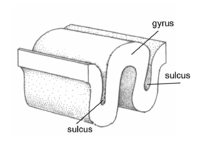
Photo from wikipedia
BackgroundNetrin-1 functions largely via combined receptors and downstream effectors. Evidence has shown that astrocytes express netrin-1 receptors, including DCC and UNC5H2. However, whether netrin-1 influences the function of astrocytes was… Click to show full abstract
BackgroundNetrin-1 functions largely via combined receptors and downstream effectors. Evidence has shown that astrocytes express netrin-1 receptors, including DCC and UNC5H2. However, whether netrin-1 influences the function of astrocytes was previously unknown.MethodsLipopolysaccharide was used to stimulate the primary cultured astrocytes; interleukin release was used to track astrocyte activation. In vivo, shRNA and netrin-1 protein were injected in the mouse brain. Infarct volume, astrocyte activation, and interleukin release were used to observe the function of netrin-1 in neuroinflammation and brain injury after middle cerebral artery occlusion.ResultsOur results demonstrated that netrin-1 reduced lipopolysaccharide-induced interleukin-1β and interleukin-12β release in cultured astrocytes, and blockade of the UNC5H2 receptor with an antibody reversed this effect. Additionally, netrin-1 increased p-AKT and PPAR-γ expression in primary cultured astrocytes. In vivo studies showed that knockdown of netrin-1 increased astrocyte activation in the mouse brain after middle cerebral artery occlusion (p < 0.05). Moreover, injection of netrin-1 attenuated GFAP expression (netrin-1 0.27 ± 0.06 vs. BSA 0.62 ± 0.04, p < 0.001) and the release of interleukins and reduced infarct volume after brain ischemia (netrin-1 0.27 ± 0.06 vs. BSA 0.62 ± 0.04 mm3, p < 0.05).ConclusionOur results indicate that netrin-1 is an important molecule in regulating astrocyte activation and neuroinflammation in cerebral ischemia and provides a potential target for ischemic stroke therapy.
Journal Title: Journal of Neuroinflammation
Year Published: 2018
Link to full text (if available)
Share on Social Media: Sign Up to like & get
recommendations!